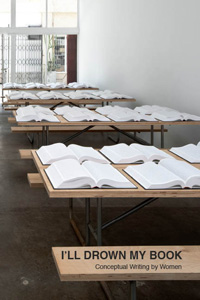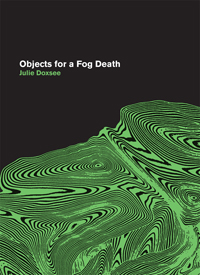 I’ll Drown My Book: Conceptual Writing by Women
I’ll Drown My Book: Conceptual Writing by Women
Edited by Caroline Bergvall, Laynie Browne, Teresa Carmody, & Vanessa Place
Les Figues Press, 2012
455 pages / $40 Buy from Les Figues Press
(Disclosure: I honestly had no idea when I requested the book but note that it contains the work of some of my friends, acquaintances, teachers, mentors, and personal heroes, though the widescreen approach in curating the book’s 64 writers works against me simply cheering on a select group or writer to whom I’m personally attached.)
Prior to reading I’ll Drown My Book: Conceptual Writing by Women, my general, sloppy idea about conceptual writing was that it was only the kind of writing where the experience of appropriated text as object/concept was more important than the experience of reading what’s been sculpted into book form for “literary” value. Instead, I’ll Drown My Book offers approaches to encountering and writing text as various as the writers included and as familiar as “appropriation,” “intertextuality,” “hybrid” and “constraint,” named in the book alongside “dissensual,” “baroque,” and thirteen other broad categories as forms conceptual writing might take.
What’s important and unique about the writing in I’ll Drown My Book isn’t what strategy is being employed but the fact that there is a strategy, and often a structure. (The two being different in that strategy involves an approach guided by a given or created set of rules while structure involves use of a given or created form other than a continuous or broken line.) You could claim that all writing is strategic in some way with respect to what decisions you make when you set out to write anything but the writing in the anthology is strategic specifically because the strategies are local, formal, and often overt vs. obscured from the reader. Conceptual writing, here, is not a movement but a methodology, a way of viewing writing as always following and rewriting a myriad of different kinds of other texts, or by replacing “writer” with text. Just for the sake of contrast I’m claiming the nominal state of what let’s call “normative” writing is that you can and do claim sole authorship,over additive and usually linear text, starting off in your headspace with an idea or image or voice that seems worth pursuing and building on it alone, meaning, in the words of Frank O’Hara, you just go on your nerve.



 Objects for a Fog Death
Objects for a Fog Death